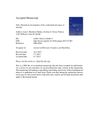 10 citations,
November 2015 in “Plant Foods for Human Nutrition”
10 citations,
November 2015 in “Plant Foods for Human Nutrition” Hibiscus petals helped control blood sugar and improve liver and pancreas health in diabetic rats.
 4 citations,
March 2006 in “Journal of renal nutrition”
4 citations,
March 2006 in “Journal of renal nutrition” Dialysis patients benefit from water-soluble vitamins but need careful management to avoid risks.
 52 citations,
January 2005 in “International journal of experimental pathology”
52 citations,
January 2005 in “International journal of experimental pathology” Melatonin may reduce skin damage caused by X-rays in rats.
110 citations,
April 2020 in “Advances in Wound Care” Nanotechnology shows promise for better chronic wound healing but needs more research.
133 citations,
July 2020 in “Cells” Creating fully functional artificial skin for chronic wounds is still very challenging.
 1 citations,
November 2015 in “Lʹvìvsʹkij klìnìčnij vìsnik”
1 citations,
November 2015 in “Lʹvìvsʹkij klìnìčnij vìsnik” Correcting trace element imbalances may help reduce alopecia areata symptoms.
 6 citations,
February 2023 in “Biomaterials Research”
6 citations,
February 2023 in “Biomaterials Research” Special gels help heal diabetic foot sores and reduce the risk of amputation or death.
 17 citations,
February 2015 in “Phytochemistry Reviews”
17 citations,
February 2015 in “Phytochemistry Reviews” Southeast Asian herbs show promise for skin and hair care, but more research is needed to confirm their effectiveness in cosmetics.
 3 citations,
July 2017 in “Journal of Molecular Graphics & Modelling”
3 citations,
July 2017 in “Journal of Molecular Graphics & Modelling” The study found that baicalin has different stable shapes in gas and water, with two shapes better for interacting with positive charges in water.
 July 2024 in “International Journal of Molecular Sciences”
July 2024 in “International Journal of Molecular Sciences” Nannochloropsis salina fermented oil may help treat hair loss by promoting hair growth and reducing oxidative stress.
 1 citations,
June 2023 in “Ethnobotany research and applications”
1 citations,
June 2023 in “Ethnobotany research and applications” The review concludes that the Ziziphus species, especially jujube, may promote hair growth and have various health benefits, warranting more research.
 May 2024 in “International Journal of Nanomedicine”
May 2024 in “International Journal of Nanomedicine” Biodegradable polymers can improve cannabinoid delivery but need more clinical trials.
 November 2024 in “International Journal of Molecular Sciences”
November 2024 in “International Journal of Molecular Sciences” Nanoparticles may improve caffeine delivery for hair growth, offering a potential alternative to minoxidil for hair loss treatment.
 January 2024 in “Clinical dermatology open access journal”
January 2024 in “Clinical dermatology open access journal” Hemp-derived cannabinoids can benefit skin and hair without causing a high.

The new hydrogel helps heal burn wounds better than current options by reducing bacteria and inflammation.
 15 citations,
November 2015 in “Journal of Cosmetic Dermatology”
15 citations,
November 2015 in “Journal of Cosmetic Dermatology” Botanicals like green tea extract show potential for hair growth, but more research is needed.
 9 citations,
July 2018 in “Current Pharmaceutical Design”
9 citations,
July 2018 in “Current Pharmaceutical Design” HO-1 helps skin health and healing but can worsen melanoma; it's a potential treatment target for skin diseases.
 191 citations,
February 2002 in “Archives of Dermatology”
191 citations,
February 2002 in “Archives of Dermatology” Some herbal therapies may help with skin conditions, but more research is needed to confirm their safety and effectiveness.
 9 citations,
June 2022 in “Reviews in Environmental Science and Bio/Technology”
9 citations,
June 2022 in “Reviews in Environmental Science and Bio/Technology” Maritime pine bark has various chemical components useful for different industrial uses.
 December 2023 in “World Journal Of Advanced Research and Reviews”
December 2023 in “World Journal Of Advanced Research and Reviews” A natural hair mask was made to improve hair growth and prevent hair loss safely.

Some TikTok hair loss remedies like rosemary oil, onion juice, and garlic gel show promise, but more research is needed and they might delay proper treatment.
2 citations,
August 2022 in “Animals” Essential oils may improve dogs' health and melatonin can help with their sleep and anxiety, but both should be used carefully.
 6 citations,
May 2022 in “Frontiers in Microbiology”
6 citations,
May 2022 in “Frontiers in Microbiology” Marine microbes could be used in cosmetics for sun protection, skin care, and possibly preventing hair loss.
February 2025 in “Journal of Investigative Dermatology” DMG-Na may help reduce hair loss and improve hair growth, but more research is needed.
 2 citations,
August 2023 in “Marine drugs”
2 citations,
August 2023 in “Marine drugs” Collagen from tilapia scales may improve hair and skin health by reducing stress and inflammation and encouraging hair growth.
 July 2024 in “Current Pharmaceutical Design”
July 2024 in “Current Pharmaceutical Design” Biodegradable polymers help wounds heal faster.
 August 2024 in “PLoS ONE”
August 2024 in “PLoS ONE” Younger Jordanians know more about rosemary, often using it for hair and stomach issues.
 January 2012 in “Vitamins & trace elements”
January 2012 in “Vitamins & trace elements” Smoking and drinking can lower vitamin levels and potentially trigger early hair loss, but overall vitamin levels don't seem to affect hair loss duration.
 5 citations,
October 2022 in “Phenomics”
5 citations,
October 2022 in “Phenomics” Your skin is like an ecosystem, with its own community of microbes and substances that interact and affect its health.
 170 citations,
September 2019 in “Evidence-based Complementary and Alternative Medicine”
170 citations,
September 2019 in “Evidence-based Complementary and Alternative Medicine” Some medicinal plants can help heal wounds and may lead to new treatments.

























